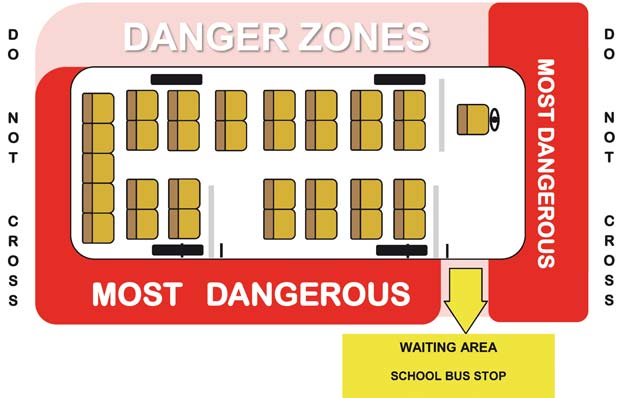 Meeting children at the bus stop:
Meeting children at the bus stop:
DO …
• wait on the same side of the street as the bus stop.
• go to your child at the bus stop.
DO NOT …
• wait in a parked car.
• wait in a building.
• allow your child to come to you.
Bottom line: When you meet your child at the bus stop, take charge of the situation. You are the adult. Only you can reduce risk and control the situation.
Getting on and off the bus:
• Be on time. Walk, do not run, to the bus stop.
• When waiting for the bus, take at least three large steps away from the curb.
• Take your seat on the bus, and stay in it while the bus is moving. If there are seat belts, buckle up.
• When getting off the bus, take three large steps away from the curb, and wait for the bus to leave before crossing the street.
• Never cross the street in front of or behind a bus.
Danger Zones:
Educate your child on the danger zones as shown in the above picture. Make sure your child takes extra precautions when near a school bus. Teach your children to never cross in front of or behind a bus. Remember that in Europe, traffic is not required to stop when buses are loading or unloading passengers.
Department of Defense Education Activity behavior standards for students:
Stress good behavior on the bus. Good behavior and safety go hand in hand. On or around buses, students must conduct themselves in accordance with these school bus rules:
• Obey the bus driver or adult.
• Enter and exit the bus safely, and always show your bus pass.
• Stay properly seated, and use seat belts when available.
• Keep your hands, feet and other body parts to yourself.
• Do not throw things inside the bus.
• Do not throw anything out the windows.
• Remain quiet, and do not disturb the driver or others.
• No profanity, indecency, smoking, prohibited items or vandalism are allowed.
• Do not eat, drink or chew gum while on the bus.
• Be responsible, and be safe.







